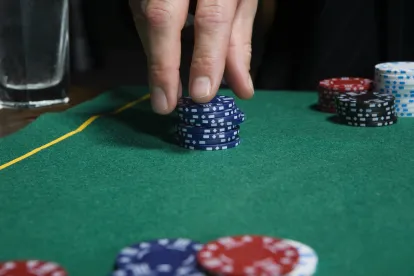President Trump has declared a national emergency as a result of the novel coronavirus (COVID-19) pandemic, and more than 30 States have made emergency declarations in response to COVID-19. Governors of the States of California, Washington, Oregon and New York have issued executive orders or proclamations prohibiting “large gatherings,” which in California, Washington and Oregon include gatherings of 250 people or more. California’s Executive Order and accompanying public health directives include specific guidance for gambling venues.
New York’s Governor ordered all theaters seating 500 people or more to cancel all future performances and prohibited all “large gatherings” of 500 persons or more. Some States and cities have further ordered the closure of all restaurants and bars other than for take-out or delivery service. The State of Maryland ordered all casinos and racetracks in the State to close and gaming regulators in the Commonwealth of Massachusetts have suspended commercial gaming operations.
The States of California, Oregon, Washington and New York are States in which sovereign Native American nations own and operate tribal gaming facilities. Tribal casinos are primarily regulated by each respective tribe on whose “Indian lands” the gaming facility is located. How do these State emergency executive orders and proclamations impact tribal gaming operations? Are tribes required to follow their respective state orders?
As a general rule and in ordinary circumstances, the simple answer would be “no,” tribes are not required to follow the state orders. Under federal law, federally recognized tribes are semi-sovereign nations that exercise governmental powers and sovereignty over their members and territory. State governments have limited jurisdiction over tribes and their activities, and as a general rule States lack legal authority to govern tribal activities on tribal land. Similarly, local or municipal laws and emergency actions legally do not govern or apply to tribal lands.
However, in these extraordinary times, the answer may not be so simple. Tribal and federal law require that each tribe conducting gaming ensures that its gaming facilities adequately protect public health and safety. The Indian Gaming Regulatory Act, 25 U.S.C. § 2701 et seq., (“IGRA”), a federal law that authorizes and regulates tribal gaming, requires that each tribal gaming ordinance enacted by a tribe include this public health and safety requirement. The National Indian Gaming Commission (“NIGC”), the primary federal regulator of tribal gaming, cannot approve a tribe’s gaming ordinance unless such ordinance includes this public health and safety provision. This may be why numerous tribal gaming operations in the States of Michigan, New Mexico and California, including Pechanga Resort Casino in Temecula, California, San Manuel Casino in Highland, California and Harrah’s Resort SoCal in Valley Center, California have announced that their casinos voluntarily would close through the end of March. Other Tribes located in the State of California indicated that their casinos would voluntarily comply with California’s entertainment gambling venue guidance. As the federal government and state and local governments issue emergency orders and guidance, we should expect that individual tribes will make their own governmental decisions that are necessary to protect public health and safety in their tribal gaming facilities.
If federal government authorities and state government authorities disagree with tribal governments over how tribes are ensuring public health and safety at their tribal casinos, federal law provides additional tools and enforcement mechanisms that could be used to exert additional pressures upon tribal operations. For example, IGRA authorizes the NIGC to exercise regulatory and enforcement authority over Class II tribal gaming operations. Federal regulations at 25 C.F.R. § 573.4(a)(12) authorize the NIGC to issue an order of temporary closure if a gaming facility is maintained or operated in a manner that threatens public health and safety, in violation of a tribe’s NIGC approved gaming ordinance.
The NIGC issued COVID-19 guidance on March 12, 2020 (“COVID-19 Guidance”). Guidance reiterates IGRA’s requirement to protect public health and safety in tribal gaming facilities and encourages individual tribal gaming commissions and regulators to actively engage with community authorities to ensure the public health and safety at tribal casinos. The agency indicates in the NIGC Guidance that it will “collaborate” with tribes and work with tribal gaming regulators to monitor public health and safety at tribal casinos. Further, the NIGC Guidance includes COVID-19 best practices from the NIGC’s Director of Compliance, urging tribal gaming regulators to follow CDC guidance with respect to COVID-19. CDC guidance issued after the COVID-19 Guidance urges “gatherings” of 50 people or more to be cancelled or postponed for the next eight weeks (although the guidance provided that it does not apply to businesses).
With respect to Class III gambling (Las Vegas-style gambling), IGRA requires that a tribe contract with the tribe’s respective State government for a “compact” (a “Compact”) governing casino operations. Each Compact sets forth conditions, standards and terms under which a tribe may conduct Class III gaming. Many Compacts between tribes and the State of California require that the respective tribe not conduct Class III Gaming in a manner that “endangers public health, safety or welfare.” Compacts between tribes and the State of Washington include public health and safety provisions requiring each respective tribe to follow its own laws regarding public health and safety and requiring each tribe to follow Indian Health Services public health standards. As the pandemic spreads, it is possible that States may take more aggressive actions to enforce the public health and safety provisions in their Compacts. In the past, the California State Attorney General has filed for injunctive relief against a tribe to enforce the public health and safety clause of a Compact when a leadership dispute led to violence in a tribal casino. In that case, the NIGC quickly followed with a temporary closure order. The NIGC Notice of Violation and Temporary Closure Order alleged that the tribe was failing to operate its casino “in a manner that adequately protects public health and safety.” [1]
Tribal governments are obligated under tribal and federal law to ensure public health and safety within their tribal gaming facilities. While each tribal government has the sovereign authority and obligation to determine how best to protect public health and safety in its community, we expect that State emergency orders and proclamations will result in political pressure upon tribal governments to either voluntarily follow State guidance or to enact similar tribal measures to State actions. Finally, if such tribal measures are not taken, the NIGC could issue additional regulations or engage in enforcement actions to ensure that tribes meet their public health and safety obligations.




 />i
/>i

